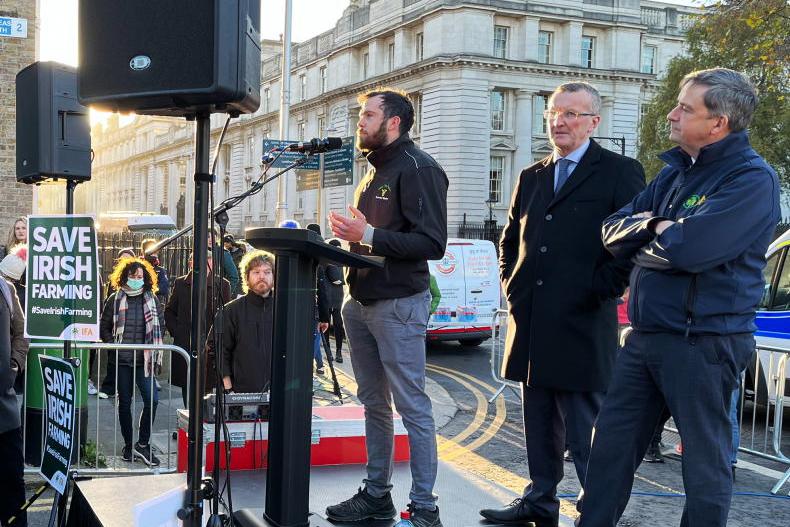Supermac’s Holdings, which includes the burger chain as well as hotel and motorway services businesses, reports a €47.9m drop in revenue to €141.5m for the year ended 31 December 2020 with operating profit down €1.7m to €23.3m.
Operating staff numbers were cut back from 1,868 the previous year to 1,347, reducing staff costs by €19.2m. Money received from the temporary wage subsidy scheme was set off against wages and salaries, while money received from the employment wage subsidy scheme and COVID-19 restriction support schemes were treated as other income.
Meanwhile, Rangeland Foods, the speciality burger manufacturer, revealed a drop in turnover of €2.3m to €21.3m for 2020.
Profit after tax and depreciation was slightly higher at €1.010m compared with €916,710 the previous year.

Macra president John Keane (at the microphone) at last Sunday's protest in Dublin.
Employee numbers were down from an average of 67 in 2019 to 58 in 2020 and staff costs to the business reduced by €925,736.
Supermac’s Holdings, which includes the burger chain as well as hotel and motorway services businesses, reports a €47.9m drop in revenue to €141.5m for the year ended 31 December 2020 with operating profit down €1.7m to €23.3m.
Operating staff numbers were cut back from 1,868 the previous year to 1,347, reducing staff costs by €19.2m. Money received from the temporary wage subsidy scheme was set off against wages and salaries, while money received from the employment wage subsidy scheme and COVID-19 restriction support schemes were treated as other income.
Meanwhile, Rangeland Foods, the speciality burger manufacturer, revealed a drop in turnover of €2.3m to €21.3m for 2020.
Profit after tax and depreciation was slightly higher at €1.010m compared with €916,710 the previous year.

Macra president John Keane (at the microphone) at last Sunday's protest in Dublin.
Employee numbers were down from an average of 67 in 2019 to 58 in 2020 and staff costs to the business reduced by €925,736.







 This is a subscriber-only article
This is a subscriber-only article










SHARING OPTIONS: